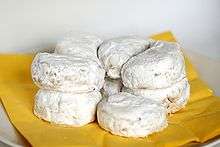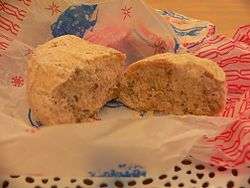Qurabiya
|
Qurabiya of Tabriz | |
| Type | Shortbread |
|---|---|
| Place of origin |
|
| Region or state | Iranian Azerbaijan |
| Main ingredients | Almond flour, sugar, egg white, vanilla |
| Variations | Kourabiedes, mantecado, polvorón, pan de polvo |
| Similar dishes | |
|
| |
Qurabiya (Azerbaijani: قورابیه Qurabiyə, Turkish: Kurabiye, Arabic: غرّيبة, Albanian: Kurabie, Greek: κουραμπιές, Bulgarian: курабия, Persian: قرابیه), is a shortbread-type biscuit originating from Iran, usually made with ground almonds.
History
Cookies appear to have their origins in 7th century Persia, modern day Iran, shortly after the use of sugar became relatively common in the region.[1]
Kurabiye appears in the Ottoman cuisine at XVth century and the word's origin may be Turkish (p. 259 of the source).[2]
Regional variations
Iranian Azerbaijan
In Tabriz, they are made of almond flour, sugar, egg white, vanilla, margarine and pistachio. It is served with tea, customarily placed on top of the teacup to make it soft before eating.
Greece

Kourabiedes or kourabiethes (Greek: κουραμπιέδες) resemble a light shortbread, typically made with almonds. Kourabiedes are sometimes made with brandy, usually Metaxa, for flavouring, though vanilla, mastika or rose water are also popular. In some regions of Greece, Christmas kourabiedes are adorned with a single whole spice clove embedded in each biscuit.[3] Kourabiedes are shaped either into crescents or balls, then baked till slightly golden. They are usually rolled in icing sugar while still hot, forming a rich butter-sugar coating.[4] Kourabiedes are especially popular for special occasions, such as Christmas or baptisms.
Bulgaria
Kurabii name of the Bulgarian cuisine and the many varieties of cookie, a popular sweet variety. Especially during the holiday season, and a variety of jams produced via the new year with powdered sugar cookies decorated with cute shapes are called maslenki.
Spain

Polvorón is a type of Andalusian shortbread popular in Spain and some former Spanish colonies such as the Philippines during Christmas. Polvorones are made of flour, sugar, milk, and nuts, but they also include pig fat. They were traditionally produced for the Christmas season from September to January but are now often available year round. There are about 70 factories in Andalusia that are part of a syndicate that produce polvorones and mantecados.
Americas
In Mexico, there are some cookies traditionally served at weddings and celebrations. The cookies, not called qurabiya, are small rolls usually made with pecans. They are known in the United States as Mexican wedding cookies (and not as Mexican wedding qurabiyas).
Turkey
See also
References
- ↑ "History of Cookies - Cookie History". Whatscookingamerica.net. Retrieved 2015-02-27.
- ↑ Muhammed bin Mahmûd-ı Şirvânî (2005). 15. yüzyıl Osmanlı mutfağı. Gökkubbe. ISBN 978-975-6223-84-0.
- ↑ Sam Sotiropoulos (2009-12-23). "Greek Food Recipes and Reflections, Toronto, Ontario, Canada". Greekgourmand.blogspot.com. Retrieved 2014-03-16.
- ↑ "Irene's Kourabiedes (Kourabiethes) (Greek Butter Cookies)". Thursdayfordinner.com. Retrieved 2015-02-27.
